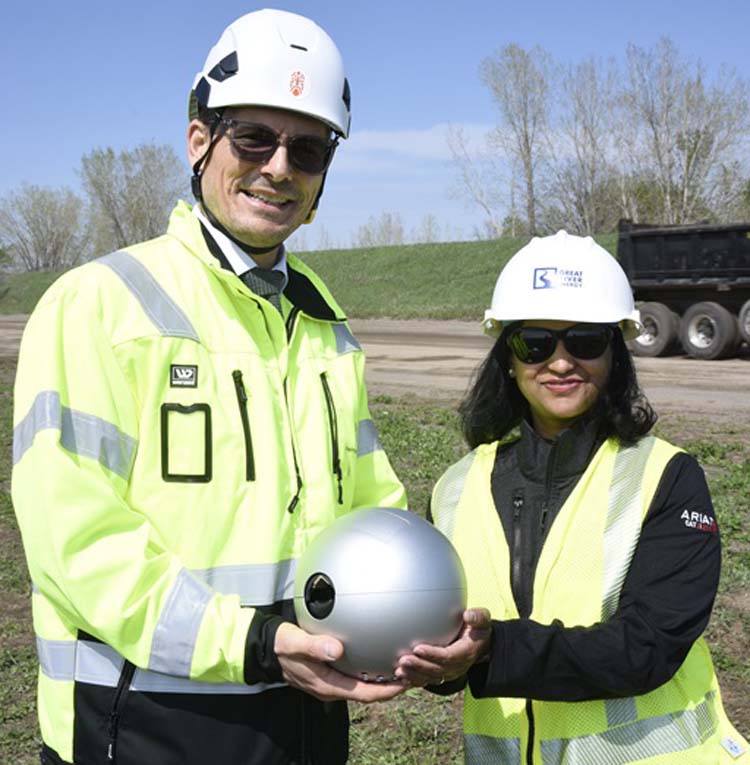Grid project: drone installation
Courtesy: Great River Energy (GRE)
Approximately 20 people gathered, April 30, near a substation in Maple Grove, Minnesota, to watch the first drone installation in the United States of a Heimdall “Neuron.”
These dynamic transmission line rating sensors collect real-time information about the line and its environment with the goal of increasing capacity, or the amount of electricity that can flow down the line.
Staff from the Minnesota Public Utilities Commission, representatives from Norway-based Heimdall Power and Great River Energy employees were present watched as the sensor was installed on a 115-kilovolt GRE transmission line that serves the local area.

Heimdall Power’s Chief Executive Officer Jorgen Festervoll
(pictured left) and GRE Vice President and Chief Transmission
Officer Priti Patel hold a Heimdall “Neuron.”
“Today is an example of what Great River Energy is doing to meet the moment. This technology is another tool in our toolbox to decarbonize Minnesota at the pace we need to,” said Great River Energy Vice President and Chief Transmission Officer Priti Patel.
As GRE and other utilities across the region continue to transition their power supplies away from fossil fuels and add more renewable energy to their portfolios, the electric grid that delivers electricity needs to evolve as well. Patel said the evolution of the grid is multi-faceted.
“We need to build more transmission, upgrade existing transmission that is at higher risk due to its age and condition, and optimize our existing transmission with new technology like this that can help us get more out of the transmission we already have, while still maintaining reliability,” said Patel.
Heimdall Power’s Chief Executive Officer Jorgen Festervoll said, “A utility like Great River Energy will be able to increase the capacity of a line by 30 to 40% at a fraction of the cost and time of putting up a new power line.”
These investments are particularly important for GRE.
“As a not-for-profit cooperative that serves 27 members in some of the poorest counties in the state, reliability and affordability are not just buzzwords for us—they are mission critical to what we do and what our members expect of us,” said Patel.
According to Patel, optimizing existing transmission infrastructure will help GRE deliver more electricity on the power lines we already have, which allows the grid to deliver more low-cost power. It also can help the cooperative delay or eliminate capital investments in some new transmission lines, allowing those dollars to be reprioritized toward other projects the cooperative’s members need.
Following a successful pilot project last year, Great River Energy will install 52 of the innovative sensors on transmission lines around its service area starting in May. This is the largest project of its kind in the United States.

Innovation
#swceINNOVATION





